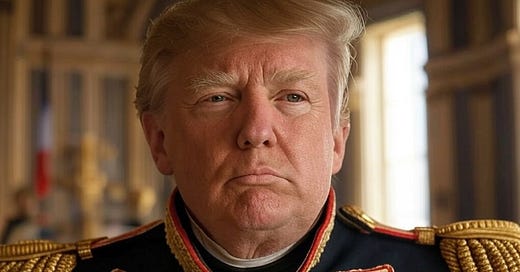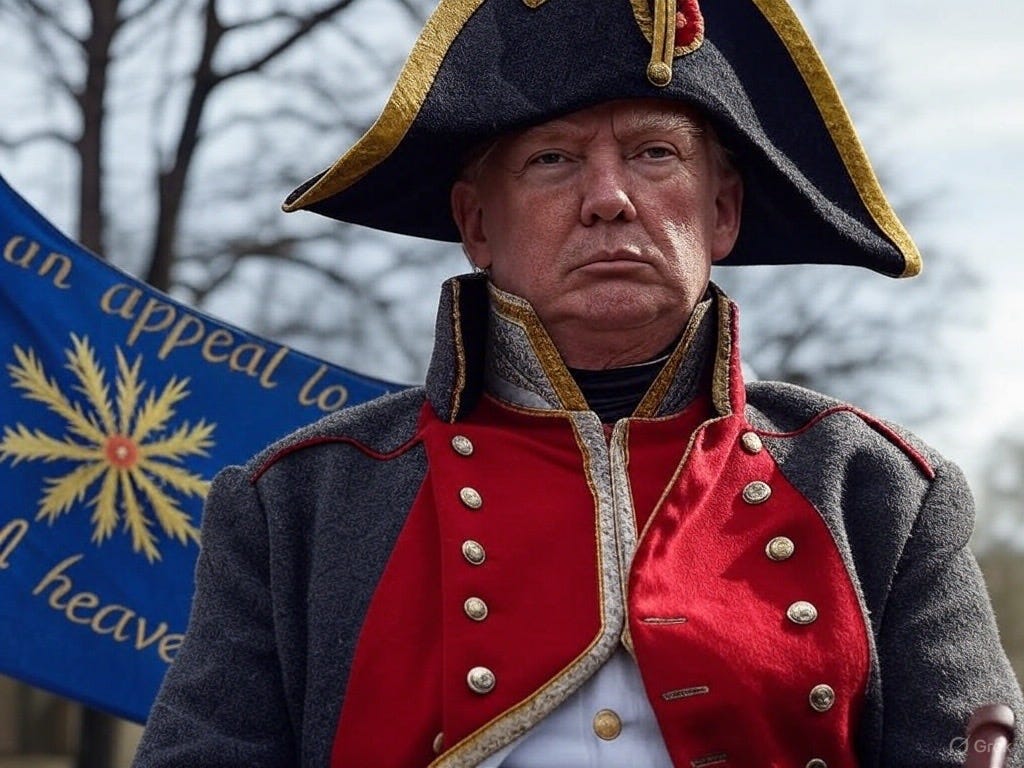Trump Russia Reset May Hit China
PLUS: Steve Yates on why Japan will fight and how Taiwan can do better (Domino Theory podcast)
Writing in The National Interest, I argue that the USA has much to gain in addition to saving lives that may result from Trump’s strong push to end the Ukraine War. I’ve enclosed that article as well as the latest podcast edition of Domino Theory, in which Steve Yates spoke with Mark Simon and me about major change coming to Asia as a result of emerging U.S. policy. One of Steve’s observations: “I think that they're lined up to do something and that China would rue the day that they awaken a normalized, powerful Japan.”
Trump’s Russia-Ukraine Reset
March 12, 2025
By: Christian Whiton
In less than two months in office, Trump may have created the conditions to derail a China-Russia power bloc against the United States.
On Tuesday, U.S. and Ukrainian negotiators reached an agreement in Jeddah, Saudi Arabia, that calls for a ceasefire between Russia and Ukraine. Ukraine also tacitly accepted a de facto framework in which the Trump administration will negotiate directly with Russia and either offer or impose an agreement on Ukraine.
Much remains undone. Russia has previously opposed a ceasefire that would halt its slow military advance, especially while Ukraine still holds Russian territory. Also, Ukraine has still not signed the minerals agreement that President Donald Trump has requested. However, Secretary of State Marco Rubio extracted a promise from Ukraine to conclude a comprehensive agreement “as soon as possible.” In any case, Russian forces appear set to retake Russian territory in Kursk held by Ukrainian forces.
The recent fast-paced shuttle diplomacy and rapid changes in policy underline even more significant changes taking place in the U.S.-Russia relationship. By ending former President Joe Biden’s Europe-first foreign policy and blank-check support for Ukraine, Trump may induce Moscow to become less of an adversary on issues of great importance to the United States. Crucially, this may include China’s confrontation with America and its Asian allies. Encouraging greater distance between Russia and China could be as big of a “win” for Trump as ending the war in Ukraine.
The possibility of Russia acting not as an ally but less of an adversary, following U.S. and European actions that pushed Moscow closer to Beijing over the past decade, has become clearer to me in recent encounters with informed Russian experts.
Clearly some in Moscow see Trump’s outreach to Russian president Vladimir Putin and pressure on Ukrainian president Volodymyr Zelensky as not only a route to ending the conflict but also a means to dramatically revising the world order. This dramatic change indicates five conclusions:
1) Thanks to Trump’s pressure on Ukraine, his departure from the Biden-era objective of inflicting “defeat” on Moscow, and fear of losing his goodwill, Russia could be willing to accept a ceasefire close to its current line of contact with Ukraine. This could happen as long as Washington, Moscow, and Kiev can agree on a framework for a permanent peace. A final detailed agreement (which could take quite some time to hammer out) is not required. All that is needed is a shared understanding of the contours of such a deal.
2) Russia is unhappy with its growing dependence on China for manufactured goods, especially cars and electronics. It wants trade with other Asian economies that can only come with peace and sanctions relief. U.S. détente with Russia could allow Moscow to diversify its economy and, importantly for Washington, become more independent from Beijing. Early cooperation could include increased U.S.-Russia cooperation in the Arctic if Washington drops sanctions and Moscow decreases the number of joint Russia-China military exercises there and in the Northern Pacific.
3) Europe could be an obstacle to peace if its leaders continue to cling to illusions of defeating a nuclear-armed state and admitting Ukraine to NATO. As Vice President JD Vance suggested on February 14 in Munich, American and European values are not identical and our European allies should take care of their own defense. Washington could trade the partial removal of U.S. forces from Europe, where they enable European free-riding and belligerence toward Russia, for arms-control or other concessions from Russia.
4) As dramatic as Trump’s shift of U.S. policy toward Ukraine and Russia has been, Moscow’s willingness to move beyond the last three years, during which U.S. armaments and targeting intelligence have helped Ukraine’s military forces to kill many thousands of Russian troops, is remarkable and creates more room for diplomacy than most experts thought would be available before Trump.
5) We need not and should not trust Russia or pretend to be allies, but a window exists this year to create lasting peace in Ukraine, end European mooching off of the United States, reduce energy costs globally, and refocus U.S. resources and attention on graver challenges.
None of this suggests that the task ahead will be easy. Russia’s demands for postwar Ukraine range from reasonable (e.g., a Ukraine that is not part of NATO and which has no large-scale joint exercises or integration with NATO militaries) to probably impossible to accept (e.g., a Ukraine with virtually no missile defenses and a giant “demilitarized” zone entirely on the Ukrainian side of its border with Russia). However, the nature of postwar Ukraine was always going to be the area of starkest disagreement between Washington and Moscow.
Also unknown is whether the current leadership of Ukraine will accept an unpalatable peace deal that nonetheless preserves its sovereignty and non-military ties with Europe, or risk losing U.S. support again to continue its desperate defense with European aid. Just as Russia worries about losing Trump’s goodwill, Ukraine should worry about what will happen if Trump walks away from peace talks if an agreement is elusive. Ukraine cannot count on sufficient European support in the face of a U.S. goal to disengage from the conflict and address more urgent priorities.
This is a lucky break for the United States. In less than two months in office, Trump may have created the conditions to derail a China-Russia power bloc against the United States—an extreme hazard. Finalizing a peace agreement that satisfies Russia and the current or future political authority in Ukraine will take skill, persistence, and well-organized diplomacy. Success is far from assured. However, the potential windfall for the United States and the loss of opportunity for its chief adversary in Beijing calls for maximum effort.
Original URL: https://nationalinterest.org/feature/trumps-russia-ukraine-reset
About the Author:
Christian Whiton was a State Department senior advisor in the second Bush and first Trump administrations. He served as a deputy special envoy for North Korean human rights issues and advised the secretary of state and other senior officials about public affairs and East Asia matters. During the 2016–2017 Trump transition, he aided in the confirmation of the secretary of state and other senior department officials. He is a senior fellow at the Center for the National Interest and a principal at Rockies Aria LLC, a public affairs and government relations firm. He previously worked for KPMG LLP, Fidelity Investments, and Oppenheimer & Co. The author of Smart Power: Between Diplomacy and War, Christian co-hosts the “Domino Theory” podcast and edits “Capitalist Notes” on Substack. He frequently appears on Fox Business and has appeared on Fox News, BBC, CNN, Newsmax, NHK, Sky News Australia, CNBC, MSNBC, and numerous other outlets. In addition to the National Interest, his articles have been published by Fox News Opinion, The Daily Caller, The Wall Street Journal, the Australian, and others. Mr. Whiton has a BA from Tulane University and an MBA from the University of California, Los Angeles.
Domino Theory Podcast
In our latest edition of Domino Theory, Mark Simon and I speak with Steve Yates about emerging Asia policy, early Trump moves that are being overshadowed by Ukraine, Taiwan’s shortcomings, how Japan will fight China’s hybrid war, how Beijing is not scared by transvestites, and Trump and Rubio’s early success in removing a Chinese company from Panama. We also discussed Bridge Colby’s hearing before the Senate Armed Services Committee to be under secretary of defense for policy. Take a look below or directly on YouTube, Spotify, or Apple and be sure to subscribe for free for guaranteed happiness and improved bowel function.
Excerpts from the Episode (edited)
Mark Simon on Taiwan and Japan versus China
I think a lot of the things that [Bridge Colby] said were self evident though. In other words, I think one of the things I really like about Trump is he's the guy who's kicking the kid out of the house. And, magically, what's happening is people are waking up.
The problem with the Taiwanese is they're not waking up in many ways. They really are consumed internally. And they're doing everything to just play around it. Now I know there's some excellent people over there. The majority are pretty good…
But the fact is we need HIMARS in Taiwan, we need them in the Philippines, and I would say our economic interest and our national security interest in Asia outweigh anything in Ukraine by a mile. And I think really when we look at Taiwan, Christian, my one thing is that it always comes down to this.
I'm hoping we can get somebody that they send over there for the [American Institute in Taiwan—America’s de facto embassy], who's going to speak more bluntly to the Taiwanese. And I think, I hope somebody in this administration is much more blunt with them in the terms and more public with the Taiwanese people about your choice about what you're going to do.
I think the Taiwanese really picked it up in the last few years. And I think the one place that's really impressed me when it comes to Taiwan is Japan. I'm a hundred percent sold that the Japanese fight.
Steve Yates on Resisting Chicom Hybrid War
I don't think China has any intention whatsoever in fighting a conventional war.
And if you look at the history of the People's Republic of China, they absolutely suck at conventional war. They are good at unconventional war. They're good at murdering people. They're good at poisoning people. They're good at polluting people's minds. They've also practiced extremely heavily without any form of ethics on cyber and other forms of attack.
I would expect that what we're going to be up against is a war like no other and if China seeks to move against Taiwan, there's going to be biological, cyber, infrastructure, all kinds of crazy crap happening in the United states and Japan if it dares to get involved. But I, I agree with Mark, though, that I think that they're lined up to do something and that China would rue the day that they awaken a normalized, powerful Japan.
But I think that we're dealing with probably drone swarms and iron domes, space-based assets, things that are happening in-country. If there's going to be survivability and resilience for that first island chain, they're going to have to be able to do things inside China that make things chaotic and different, difficult to change options inside China.
If they're going to survive, they can't just have a war of attrition like Ukraine has absorbed wave after wave from Russia. They can't absorb wave after wave from China. And so all these, I think all the decisions are going to be different. I don't think it's going to come down to how many aircraft carriers we have and can we produce a lot of the most advanced fighter jets.
I love those things. I'd love to have more of those things. I think it's going to come down to the computer geeks and a lot of this new, lighter hardware that does complicated and terrifying things in different ways. So in that sense, the Taiwanese can catch up, the Japanese can catch up, and Americans can catch up if we invest smarter in ways.
We gotta keep traditional hard power just because I think there is still staying value in that. But it's this other frontier that I expect the Communist Party to fight with. I expect a lot of their expensive platforms to come out in high quantity and crash and burn very quickly if ever used.
But they got a lot of it.







